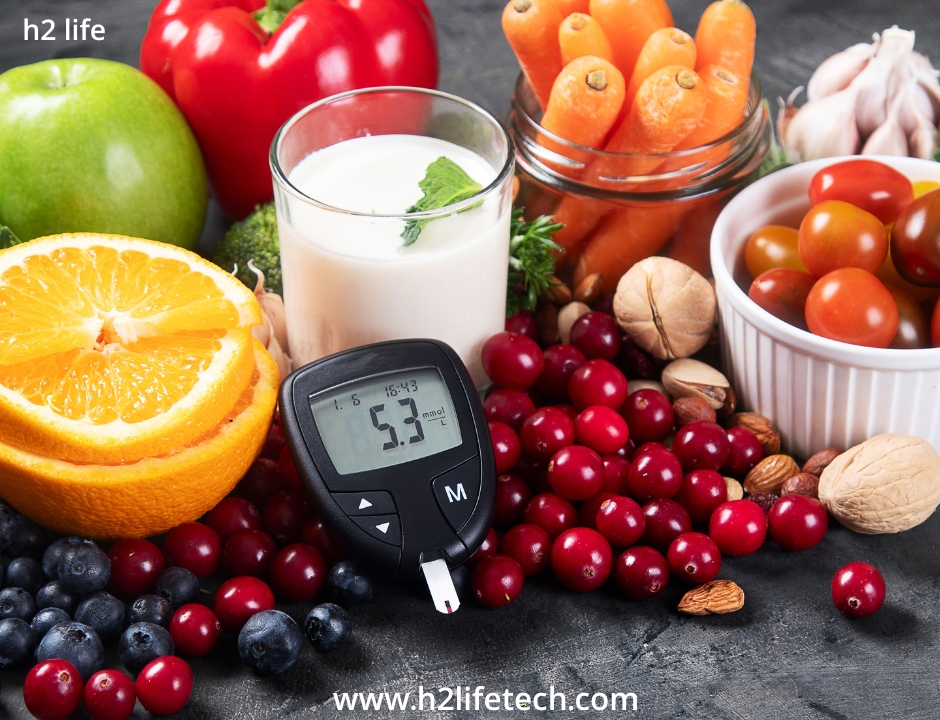Could hydrogen-rich water (HRW) change the landscape of diabetes treatment? While the idea may sound futuristic, ongoing research has shown promising potential for HRW in managing diabetes. Known for its anti-inflammatory and antioxidant properties, HRW has garnered the attention of researchers and healthcare professionals alike, offering a novel approach that extends beyond traditional treatments.

This blog dives into the science behind HRW, its benefits for diabetes management, the latest research breakthroughs, and what the future holds. Whether you’re managing diabetes or simply interested in cutting-edge health solutions, this guide has you covered.
What Is Diabetes and How Is It Treated Today?
A Brief Overview of Diabetes
Diabetes is a chronic condition that affects how your body processes blood sugar (glucose), a vital energy source for your cells. The two most common types are:
- Type 1 Diabetes (T1D): An autoimmune disease where the body doesn’t produce insulin at all.
- Type 2 Diabetes (T2D): A metabolic disorder often linked to obesity and lifestyle factors, causing insulin resistance.
Current Treatment Methods
Managing diabetes typically involves:
- Medication, such as insulin injections or oral antidiabetic drugs.
- Dietary adjustments to control blood sugar levels.
- Regular exercise to improve insulin sensitivity.
- Blood sugar monitoring to track progress and avoid complications.
While these methods are effective, they often require lifelong commitment and constant vigilance, leading researchers to explore alternative treatments like HRW.
How Does HRW Work? The Science Explained
HRW, or hydrogen-rich water, is regular water infused with molecular hydrogen (H₂), a powerful yet selective antioxidant. Here's how it works:
- Neutralizes Harmful ROS: HRW targets reactive oxygen species (ROS), specifically hydroxyl radicals, which contribute to oxidative stress and tissue damage in diabetes. Remarkably, it leaves beneficial ROS, which are essential for cellular signaling, untouched.
- Reduces Inflammation: By suppressing inflammatory markers like NF-κB, HRW may help counteract chronic inflammation associated with diabetes.
- Preserves Cellular Function: HRW has shown potential to protect mitochondrial function, which is often impaired in insulin-resistant cells.
These unique mechanisms make HRW a standout candidate for supporting diabetes management.
What the Research Says About HRW and Diabetes
Scientists have been progressively studying the impact of HRW on diabetes patients, and the results are encouraging:
1. Improves Glycemic Control and Insulin Sensitivity
A 2023 randomized controlled trial published in Diabetes Research and Clinical Practice demonstrated that diabetic patients drinking 1.5 liters of HRW daily experienced:
- Lower fasting blood glucose levels.
- Reduced HbA1c, an important long-term marker of blood sugar control.
- Improved insulin sensitivity, as measured by the HOMA-IR index.
The study suggested that HRW mitigates oxidative stress in pancreatic beta cells, enabling them to function more effectively.
2. Reduces Diabetic Complications
HRW may also offer protection against complications commonly associated with diabetes:
- Neuropathy: An animal study in Scientific Reports (2024) showed that HRW alleviates nerve damage by reducing chronic inflammation.
- Nephropathy: The same study found that HRW lowers oxidative stress, slowing kidney damage caused by diabetes.

3. Helps Prevent Prediabetes Progression
HRW could even play a preventive role. A 2023 trial in Nutrition & Metabolism reported that prediabetic adults who consumed HRW for 12 weeks experienced:
- Decreased post-meal blood sugar spikes.
- Improved lipid profiles, such as reduced LDL cholesterol and increased HDL cholesterol.
Expert Opinions on HRW
Leading experts agree that HRW shows significant promise:
- Dr. Hiroshi Ohta, a molecular hydrogen researcher, notes that "HRW has the potential to address both the root cause of diabetes and its complications by reducing oxidative stress."
- Dr. Linda Barrett, an endocrinologist, adds, "While more extensive human trials are needed, the preliminary findings are a breakthrough for type 2 diabetes management."
Practical Applications of HRW in Diabetes Management
If you’re considering HRW for diabetes, here’s how it can fit into your routine:
- Daily Consumption: Experts recommend drinking 1–1.5 liters of HRW per day, with a hydrogen concentration of 0.8–1.2 ppm.
- Best Delivery Methods: Electrolyzed hydrogen water is highly stable and preferred for consistent dosing.
- Pair with Current Treatments: HRW is not a replacement but rather a complementary addition to existing treatments like medication, a balanced diet, and exercise.
Potential Risks and Considerations
Like any health intervention, HRW has some limitations:
- Limited Large-Scale Trials: While small-scale studies and animal trials are promising, more large-scale human trials are required.
- Varying Outcomes: Results may differ based on diabetes type (T1D vs. T2D) and individual physiology.
- Requires Quality Assurance: Ensure the HRW you consume comes from a reputable provider that guarantees proper hydrogen concentration.
The Future of HRW in Diabetes Treatment
The future of HRW in managing diabetes looks bright, with ongoing research exploring its full potential. Key areas of focus include:
- Large-scale clinical trials to validate initial findings.
- Integration with wearable tech for real-time blood sugar monitoring.
- Expanding applications, such as wound healing in diabetic patients.
With its unique properties and growing body of evidence, HRW may transform diabetes care in the coming years.
Empower Your Health Journey with HRW
Hydrogen-rich water is emerging as a game-changer in diabetes management, offering a natural, non-invasive way to enhance glycemic control and reduce complications. While it’s not a standalone cure, HRW can complement traditional treatments and improve quality of life for those living with diabetes.
Curious about how HRW can fit into your health routine? Consult your healthcare provider to explore the possibilities. And if you’re ready to experience its benefits firsthand, consider trying high-quality HRW products to start your wellness journey today!
POST TAG
- Is hydrogen water good for kidneys?
- Is hydrogen water good for liver?
- What are the side effects of hydrogen water?
- Hydrogen water benefits the skin.
- How much hydrogen water a day?
REFERENCE
Here’s the latest research on hydrogen water (HRW) and diabetes, including key studies and their findings:
1. Improves Glycemic Control & Insulin Resistance
- A 2023 randomized controlled trial (RCT) in Diabetes Research and Clinical Practice found that diabetic patients drinking 1.5 L/day of HRW (1.0–1.2 ppm H₂) for 8 weeks had:
- ↓ Fasting blood glucose
- ↓ HbA1c (a long-term blood sugar marker)
- ↑ Insulin sensitivity (measured by HOMA-IR)
- Mechanism: H₂ reduces oxidative stress in pancreatic β-cells, improving insulin secretion.
🔗 Read the study here
2. Reduces Diabetic Complications
- 2024 animal study (Scientific Reports) showed HRW:
- Protects against diabetic neuropathy (nerve damage) by reducing inflammation.
- Slows diabetic nephropathy (kidney damage) by lowering oxidative stress.
🔗 Study link
3. Prevents Prediabetes Progression
- A 2023 RCT in Nutrition & Metabolism found that prediabetic adults drinking HRW for 12 weeks had:
- ↓ Post-meal blood sugar spikes
- Improved lipid metabolism (lower LDL, higher HDL)
🔗 Link to study
4. Potential Mechanism: Antioxidant & Anti-Inflammatory Effects
- H₂ suppresses NF-κB (a pro-inflammatory pathway) and ROS in diabetic patients.
- Helps preserve mitochondrial function in insulin-resistant cells (Antioxidants, 2023).
Current Recommendations
- Dosage: ~1–1.5 L/day (0.8–1.2 ppm H₂).
- Best method: Electrolyzed hydrogen water (more stable than magnesium-generated H₂).
Limitations
- Most studies are small-scale or animal-based; larger human trials are needed.
- Effects may vary based on diabetes type (T1D vs. T2D).


.webp)


0 Comments